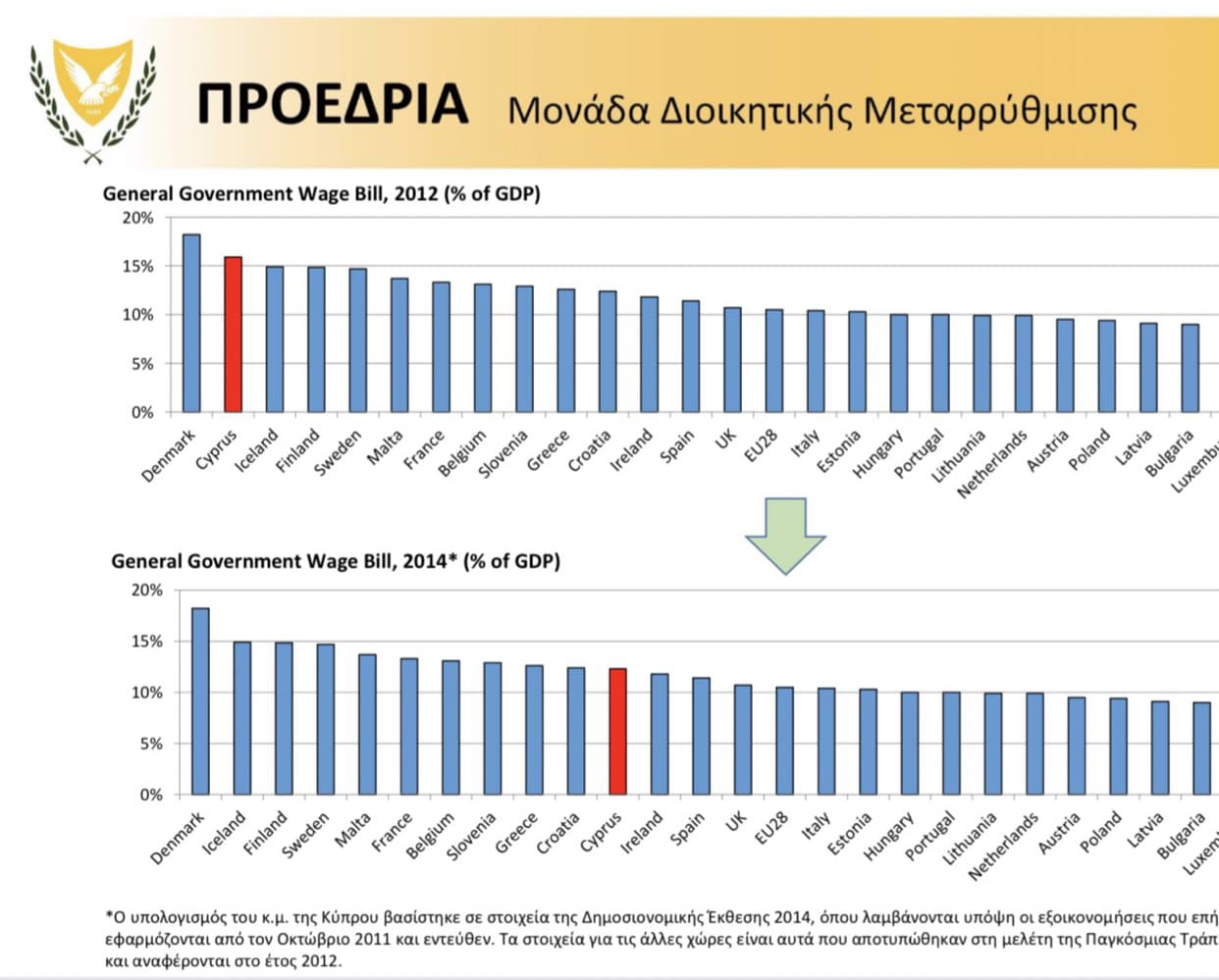Constantinos Petrides: ‘we are embarking on a similar course that led to the 2013 haircut’
Former finance minister Constantinos Petrides has slammed what he says is the hypocrisy of politicians over the alarming 15 per cent increase in the public sector payroll that will cost the taxpayer an additional €500 million in 2024.
“It is fine for Diko and Disy to express concern and say ‘we are worried about the payroll’, but this will not lower it,” Petrides told the Cyprus Mail.
“The payroll is an inelastic expense and you can’t bring it down. It will only go up thanks to pay-scale increments, annual rises and CoLA.”
Even Finance Minister Makis Keravnos expressed concern when discussing the 2024 state budget at the House finance committee last Monday, saying that this trend could not continue. The public payroll cost will be €3.7 billion, accounting for 30 per cent of state expenditure for next year.
“I have not received nor would I accept additional demands from the unions of public employees,” Keravnos told the committee, before conceding he would look at increasing the pay of public employees on the A2-A5-A7 wage scales, which included “people on very low salaries”. The latter announced on Saturday they were going on strike.
For Petrides, who had experienced the period of the economic meltdown and haircut in 2013 directly as under-secretary to the president, the alarm bells are ringing.
“People seem to have short memories,” he said. “It was only 10 years ago that our economy collapsed and we had to enter an assistance programme, yet we seem to be repeating the mistake, embarking on a similar course that led to the haircut.”
As under-secretary, Petrides and a small group of aides investigated the causes of the collapse of public finances and one of the main reasons was the spiralling public payroll.
From 2000 to 2012 the cumulative growth of the public payroll was 146.7 per cent, whereas the cumulative growth of GDP was 100.5 per cent. In 2012 Cyprus had the second highest payroll as a percentage of GDP in the EU at a little over 15 per cent, just behind Denmark.
A study into the relation of the public payroll increase and nominal GDP for each year showed that the only period in which the public payroll was the same as GDP growth was between 2004 and 2008 when Cyprus was preparing to join the euro. With the election of Demetris Christofias, it rose to 11 per cent higher than GDP growth, and began falling once measures were imposed in 2013.
Interestingly, when Cyprus entered the assistance programme in 2013, the payroll fell to 7 per cent below the GDP growth by 2014. In that year, Cyprus had moved down the EU rankings of public payroll as a percentage of GDP, from second to eleventh, on 11 per cent.
The study also looked at the main contributing factors for the payroll increase in the 2000-2012 period and found that CoLA accounted for half of it (48.8 per cent). Other factors were general pay rises (25.4 per cent), pay increments (12.3) recruitment (18.6), pension benefits (27.3) and other (14.3).
A few months ago, the Christodoulides government agreed to increase CoLA (from 50 per cent to 68 per cent of the cost of living index). This decision Petrides said “will worsen social inequality and public finances”, also stating the obvious – which most politicians consciously ignore – that it increases inflation.
“CoLA is paid by the taxpayer, 60 per cent of whom do not receive it, in contrast to the highly paid employee that does receive CoLA and causes a further increase in prices, because of the increase in income and consumption, which further reduces the income of the low earner that is not paid CoLA,” said Petrides.
A high-ranking public employee will get an increase in excess of €500 per month thanks to CoLA and benefit from the inflationary horizontal measures implemented recently by the government, said the finance minister.
“These people are not touched by inflation which affects those who are not paid CoLA,” he said. “Is this just in conditions of crisis, uncertainty and inflation?”
Concerned about the dangerous effect of a constantly rising public payroll on public finances, as under-secretary Petrides drafted a bill that would keep its growth under control. The bill consisted of a mechanism that set a ceiling on the growth of the public payroll, in line with the performance of the economy.
It envisaged that the public payroll would grow at the same rate as GDP. It suffices to say that in 2024, GDP is forecasted to grow by about 3 per cent and the payroll by 15 percent, which is a return to the bad habits of old.
“The law would not allow the veering out of control of public finances, the payroll’s disproportionate increase in relation to revenue (which are linked to GDP),” said Petrides. If the bill was in force, it would not have been possible for the payroll to rise by as much as we have seen lately, he said.
But when this bill, which would have put limits on the profligacy of politicians, was tabled in December 2016, it was rejected by the House. Only Disy and the now defunct Solidarity voted in its favour.
None of the other parties considered it necessary to control the growth of the public payroll, not having the courage to stand up to Pasydy and its then general secretary, Glafcos Hadjipetrou, who was vehemently opposed to it and had several meetings with then president Nicos Anastasiades, urging him to scrap the bill.
“If it had been approved, we would have saved as much a €2.5 billion since 2017, on the payroll,” said Petrides, who believes approval of his bill, even today would be beneficial.
“The bill offers the only way of setting a barrier, ensuring against the hiring, increase of promotion positions, upgrading of promotions etc in a reckless way, because of clientelism, while securing for public employees a fair share of the revenue of economy,” said Petrides. He pointed out that the current system “increases inequality between public and private sector”.
Keravnos conceded that something should be done about the payroll at Monday’s committee meeting, but while acknowledging the problem he offered no solution other than some general thoughts.
“In the next stages, CoLA must be linked with productivity and other parameters so it would be more effective, instead of contributing to inflationary tendencies.” Why had he not mentioned this when his colleague at the labour ministry, Yiannis Panayiotou. decided to impose the increase in CoLA, during an inflationary period.
“The payroll is the state expenditure most susceptible to petty politics and state clientelism, as it operates as spoils in the hands of politicians,” Petrides said.
It was very easy to increase and difficult to decrease, “which is why a limit to its increase, set by law, is essential.”








Click here to change your cookie preferences